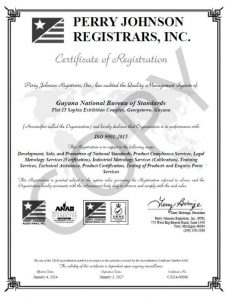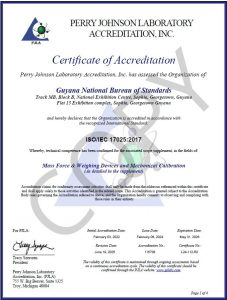The Guyana National Bureau of Standards (GNBS) as the National Measurement Institute (NMI) conducts verification and calibration of measuring instruments used in trade, manufacturing, health, transportation, and other sectors. Verifying the accuracy of the measuring instruments protects consumers, promotes safety, reduces revenue losses, drives business growth and positively impacts cross-border trade.
Meanwhile, have you ever wondered how measurements remain in accordance with global standards? The answer to this question lies in the principle of ‘measurement traceability’ which is the focus of this week’s article as we prepare to observe World Metrology Day 2023 on May 20.
Measurement Traceability is typically defined as “the property of a measurement result whereby the result can be related to a national or international reference standard through a documented, unbroken chain of calibrations.” For accuracy and consistency, measurement results from calibration should be traceable to the international system of units (SI Units) or what most of us know as the metric units.
The unbroken link of traceable measurements exists from retail in Guyana to the highest international level. As such, the weight provided by a scale in the shops or supermarkets are traceable to the Working or Field Standards used by GNBS Inspectors to verify them. These Working Standards are traceable to the National Reference Standards held in the GNBS Laboratory under controlled environmental conditions. Meanwhile, these Reference Standards are traceable to others kept at more advanced NMI’s in other countries which are then traceable to the International System of Units (SI) which relates to time, mass, volume, temperature, etc.
The GNBS National Reference Standards are calibrated by advanced NMIs in Germany, Argentina, the United States of America and Trinidad as required to maintain traceability. Keeping our instruments aligned to the global network of measurement via traceability provides confidence and assurance to stakeholders that the results emanating from the Bureau are accurate and reliable. This further guarantees that the results from the GNBS’ ISO/IEC 17025:2017 accredited calibration laboratory will be accepted in another jurisdiction, especially for stakeholders engaged in international trade whether it is export or importation of goods. It also increases consumers’ confidence that they are getting value for money.
One of the major facts mutually agreed on to maintain traceability is the worldwide adoption of the International System of Units (SI) of measurements or the metric system. On May 20, the GNBS will join other Metrology Organisations to observe World Metrology Day (WMD) 2023. WMD signifies 148 years since the signing of the Metre Convention in 1875 which made the metric system the international standard of measurement.
The GNBS is responsible for the promotion of the SI Units in Guyana and is currently working with stakeholders to eliminate the use of the imperial units of measurement. Leading up to World Metrology Day 2023, the Bureau is educating manufacturers and agro-processors on the need to properly label their products using the metric units. This comes as the organisation plans to launch the Verification of net content on pre-packaged goods offered for sale. Other stakeholders including vendors and shopkeepers are encouraged to use the metric units of measurements to support traceability and transparency.
The GNBS is always available to work with stakeholders to meet their measurement needs. For further information, reach out to the GNBS today on Telephone numbers: 219-0064 or 219-0065, or visit the GNBS website: www.gnbsgyorg. You can also WhatsApp us on +592 692 4627.






